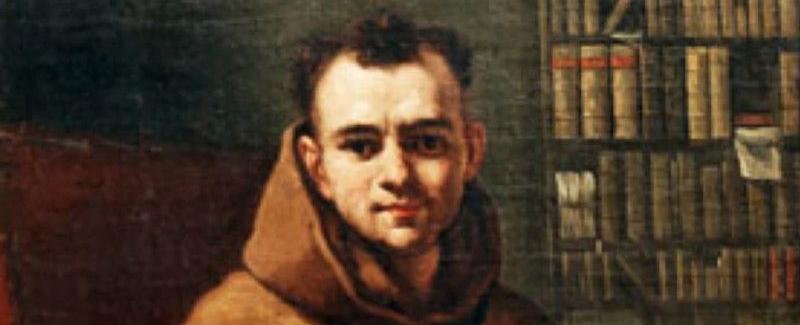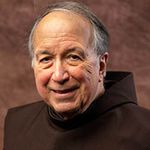Blessed John Duns Scotus: Franciscan Theologian

On November 8, Franciscans honor the memory of Blessed John Duns Scotus (c.1266-1308), one of the greatest of medieval theologians.
Early life of John Duns Scotus
His name describes his origins: John was a Scot, born in the town of Duns, Berwickshire. We do not know many details of Scotus's life. He apparently was from a leading family of Duns and entered the Friars Minor as a young man, following the example of his uncle. We know he was ordained to the priesthood in March 1291, so it seems most likely he was born in Duns about 1266 and entered the Order around 1280 at the friary in Dumfries.

John's native town, Duns, Scotland, today.
Devoted to ministry of study, teaching
John’s life as a Franciscan was devoted to the ministry of study and teaching. He was educated at Oxford in the 1280s and early 1290s; he began teaching at Oxford in the late 1290's and then was sent to the University of Paris in 1302 where he began lecturing on the Sentences of Peter Lombard. In 1303 he was briefly expelled from the University for siding with Pope Boniface VIII in his feud with Philip IV of France but quickly returned and was named Doctor of Theology in 1305. In 1307 he was suddenly transferred to the Franciscan study house in Cologne, but his brilliant academic career was cut short by his death there in his early 40s.

Scotus's tomb in the Franciscan church in Cologne, Germany. The inscription reads: Scotia Me Genuit. Anglia Me Suscepit. Gallia Me Docuit. Colonia Me Tenet ("Scotland bore me, England received me, France taught me, Cologne holds me").
Significant thinker of the Middle Ages
Duns Scotus was one of the most significant Catholic thinkers of the Middle Ages, very influential in the development of both philosophy and theology.
Concept of “this-ness”
In philosophy, Scotus emphasizes that although we can grasp a certain "common nature" shared by several things, only individual things really exist. One of his distinctive concepts is his teaching on haecceitas or "this-ness," namely that each thing in creation has a distinctive characteristic that makes it precisely this unique individual, which we we can come to know.
Primacy of Christ, doctrine of Immaculate Conception of Mary
In theology, Scotus emphasized the absolute primacy of Christ: that is, that God's Word becoming incarnate in the person of Christ was the first and ultimate goal of God's entire creative plan. This means Christ would have been born even if Adam had not sinned, making him the center of all creation, the final end for which all other things were created. The related doctine of the Immaculate Conception of the Blessed Virgin Mary fits into this creative plan.
Holiness always recognized
Within the Franciscan Order, John's holiness had always been recognized; devotion to him was officially confirmed in 1993 by Pope John Paul II, who declared him “blessed.”
Key points of Scotus’s theology
In 2010 Pope Benedict XVI gave a very nice instruction on key points of Scotus' theology.
Understanding John Duns Scotus
Dr. Mary Beth Ingham, CSJ has published several books that make Scotus accessible to the modern reader. Scotus for Dunces: An Introduction to the Subtle Doctor is the best general introduction to Scotus's thought. In Understanding John Duns Scotus: “Of Realty the Rarest-veined Unraveler," Ingham draws out the particularly Franciscan dimensions of Scotus's teachings.
The Primacy of Christ
For a detailed explanation of Scotus' teaching on the Primacy of Christ, read an article by Dr. Philippe Yates.
Dominic Monti, OFM
Professor of Franciscan Research in the Franciscan Institute of St. Bonaventure University
Dominic V. Monti, OFM, is a Franciscan Friar of Holy Name Province (USA) and currently professor of Franciscan Research in the Franciscan Institute of St. Bonaventure University. He devoted the greater part of his ministry to teaching the History of Christianity, in particular the history of the Franciscan movement. He has contributed two volumes to the Works of St. Bonaventure series and is author of Francis & His Brothers, a popular history of the Friars Minor.

